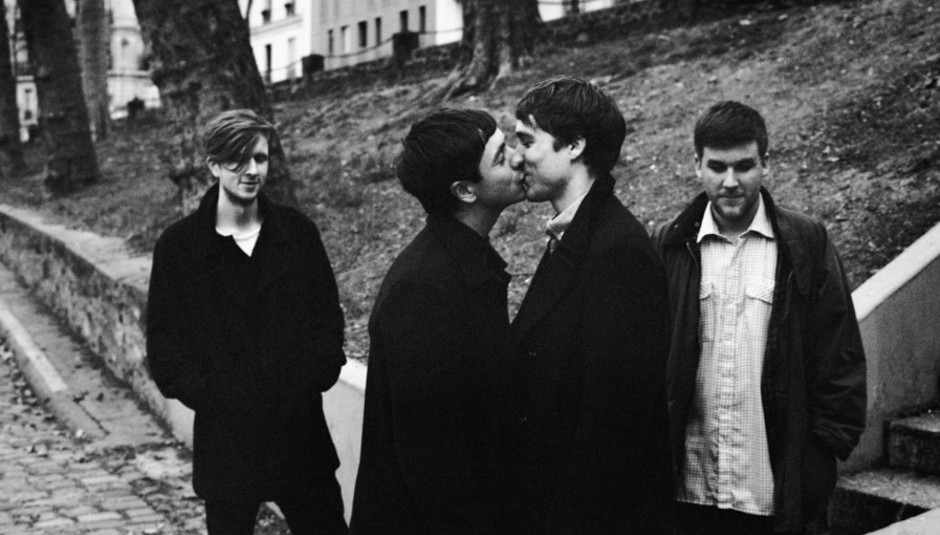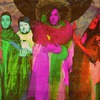2013 has been one of the finest years in living memory for debut releases. One of those bands who've put out an incredible first album are Manchester-based four-piece M O N E Y. Signed to acclaimed independent Bella Union, they released The Shadow Of Heaven in August to a cavalcade of acclaim, while their live shows have also gained a reputation as being events rather than bog-standard gigs.
Having met at Manchester University, the band - Jamie Lee (guitar, vocals), Charlie Cocksedge (guitar, keyboards), Scott Beaman (bass) and Will Byron (drums) - spent their formative years writing, recording and honing their sound to the exquisitely tuned beast standing before us today.
DiS recently caught up with band spokesperson Jamie Lee to discuss festivals, disappointing first albums, interactive audience participation and the Mercury Music Prize.
DiS: You've played numerous festivals over the course of the summer. How do they all compare with one another, from the bigger ones like Latitude to the more boutique events such as Green Man, End Of The Road and Festival No. 6?
Jamie Lee: They're all much of a muchness from our perspective. It's a bunch of people in a field watching bands at the end of the day. I think it's great to be able to come and watch loads of bands that you like, but at the same time it can also be quite lazy. I much prefer going to watch bands playing by themselves rather than grouping them all together. People might want to get out of the city, come to the countryside and have a little holiday but they can be quite messy, drug-riddled events which I find a bit sad really. I guess I'm tarnishing a lot of festivals by generalising them all like that. Green Man wasn't really like that was it?
DiS: What about festivals in mainland Europe? You've played several there as well. How do they compare in terms of organisation and audience reaction?
Jamie Lee: I think the expectations of the audience are slightly different because they'll go and watch bands that they don't really know. But I want things that are unattainable at festivals. I want music to be played out of urinals at 5am. But that's not going to happen so I suppose I have to accept the reality that if you want to come to a festival it has to be outside. That's part of the experience and you have to share a stage with loads of other bands. That is enjoyable but I would like something a little bit more. We're coming out the back end of this romance with music festivals. Ten years ago I read articles saying people were spending less money going on holidays than they were at festivals. Maybe they still are but I think they're starting to lose a bit of faith.
DiS: The market has become saturated and the line-ups are homogeneous and predictable for the most part.
Jamie Lee: Us for instance?!? No, but it does feel like we've spent the whole of this summer just going from one festival to another. I think most bands will have the same opinion. Doing lots of gigs is a necessary part of being in a band. You want to make them all special but that's not always going to be the case, so there is some kind of routine to it which isn't necessarily a bad thing to suffer.
DiS: On the positive side playing festival shows can also generate a lot of new fans.
Jamie Lee: Definitely. It can be a very efficient tool. I kind of feel guilty about that because if the music was good enough on record you wouldn't have to play any shows at all.
DiS: I guess that may have been possible 12-15 years ago when people like John Peel were championing new music on the radio and MTV was at its height, but it's quite difficult for new artists to gain the same levels of exposure at this moment in time.
Jamie Lee: I just don't agree with the concept of making people want to like you, or wanting to be liked even. That's a trait of my personality as it is with most people's I guess. If part of the creative process involves wanting to be liked it negates your authority.
DiS: It is a sad factor that many artists do make music purely to appeal to a certain demographic or just to be popular in general. I don't get that with M O N E Y though. Hearing the album and watching you play live it's clear you're singing from the heart. There's an intensity that's lacking from a lot of other current bands for instance.
Jamie Lee: I think we have been guilty of trying to appeal to certain trends or groups of people at times. We do occasionally try to emulate things we've heard. I'm an idealist but a failing one. I think we've made a populist record with The Shadow Of Heaven, but we're going to try and do something more interesting with the next one.
DiS: The reviews for the album have been almost unanimously positive. Were you expecting that kind of response?
Jamie Lee: We wanted it to live up to our expectations so I guess reviews are one way of gauging whether it's had the same effect on people after they've listened to it. But I also feel like people were being slightly sympathetic towards us. I think they saw a band that didn't quite nail their debut record, could have made a better one but showed some kind of potential. I read a lot of music magazines where people give you 7/10 which to me is non-committal as to whether the record's good or bad other than to say we want to support these people in the future. I don't feel we've made a great record which is a shame because I'd loved it to have been just that.
DiS: Really? I'm quite surprised you say that as I'd expect it to be high in many end-of-year "Best Of" lists.
Jamie Lee: I guess if I was in a more positive place then things would start to settle in? I don't know, the negative reviews you tend to take to heart more. I read those and it is easier to believe them. Or maybe that's just my personality?
DiS: The Mercury Music Prize nominations were announced the other week. How do feel about those kind of awards? Is it something the band aspire to in terms of attaining recognition?
Jamie Lee: It would probably feed your ego, which wouldn't be very healthy would it?
DiS: It wouldn't, but again coming back to the earlier point about bands wanting to be liked, there are also bands and labels that deliberately target awards ceremonies such as the Mercury Prize.
Jamie Lee: There are, but we're not one of them. We didn't submit The Shadow Of Heaven for the Mercury Prize. Maybe that's a bit half-arsed of us? I don't know.
DiS: By the same token, I also know of at least one band that refused to submit an application to the Mercurys because they had to pay for it. Their argument being that if it's an award supposedly based on artistic merit, why should they have to pay to enter?
Jamie Lee: I think it's about more than the money, in that maybe the whole landscape associated with that prize just isn't worth getting involved with in the first place. It's not really based on artistic merit is it? It's over-complicated and bureaucratic, so maybe it's worth just forgetting that it even exists. I think that's the attitude a lot of musicians have had to come to learn. We don't really have a place in mainstream pop because the beast is just impossible to beat.
DiS: Do you classify M O N E Y as being your archetypal guitar band bearing in mind there are so many other elements to the songs and with the live show?
Jamie Lee: In a way I do. We're still a pop group. Someone once called us Coldplay for hipsters. They said if you got Wu Lyf to be fronted by Chris Martin it would be us!
DiS: "The orphans of Joy Division" is the most ridiculous quote I've read...
Jamie Lee: Ha Ha, that's funny! I don't really know what we sound like. We've taken different references in different songs from different kinds of music that we like.
DiS: Every time I've seen M O N E Y play live you've ended up in the audience at some point of the set. Is that one of your goals, to break down barriers between band and audience?
Jamie Lee: I don't do that every time we play. At the same time, if I was playing a gig in my flat to my friends, that's how I would perform. I don't want to be too philosophical about it but it's much more enjoyable doing that than standing on stage going through the motions as it were. I like people that choose to demonstrate their individuality and their character when they perform. I know it's not everything but it's just me showing a little bit of myself, and I think people respond to that. Although that wasn't the aim. I like being confrontational. Not necessarily in a bad way but I do like challenging certain things. I have that attitude, I get drunk, I start to do it for fun and then it becomes part of some kind of act I suppose, but like I said, it doesn't happen every time. When you're on stage, you are there to prove a point, you are there to send some kind of message. That's the reason why it's become something I do.
DiS: Have you ever had a negative response?
Jamie Lee: Were you at End Of The Road festival?
DiS: No.
Jamie Lee: Well it didn't go down too well there. Sometimes people don't feel very comfortable around me when I'm doing it. Some do, some don't... Not everyone feels the same. Some people just want a band to get up on stage, play songs and let the music speak for itself. Which is fine. But then maybe we do things this way because we can't do that?
DiS: Moving onto the album, how long did The Shadow Of Heaven take to finish? Was it a long process? Are there any songs left over from that period which might see the light of day in future?
Jamie Lee: I suppose you could look at it like this. From the first song that was written on that record, 'Letter To Yesterday', I started playing on the guitar when I was twenty or twenty-one. I'm now twenty-six. Whereas the last song we finished, 'The Shadow Of Heaven', were still writing when the album was being recorded. So in total you could say it took five, maybe five-and-a-half years in total. Will (Byron), our drummer and producer has made a rule that we're not allowed to use any old songs on the next record, which is a shame because we have some good ones kicking about. I think he wants a clean sheet to start from. We have got a couple left over that we'll probably release as b-sides or downloads.
DiS: What is 'Letter To Yesterday' about? It's probably my favourite song on the record.
Jamie Lee: I suppose it's about every person, whether they want to be an artist or a shoemaker or a butcher having to make a choice about overcoming people's expectations. What people want from you, what they expect from you. Sticking with something and having the courage to do that. I suppose that was me at twenty-one saying even though I'm not very good at this; I can't sing and I can't really play; I'm gonna try and make myself into that creative person.
DiS: A lot of the album does sound very personal. 'Goodnight London' for instance strikes a chord as well. What's the story behind that?
Jamie Lee: We all know that time in the evening where in suburban winter it all becomes dark in the evening very quickly. You're living in very close proximity with other people yet seemed very removed from it. Even things like trains going past you in the park, it feels like everything is collaborating with each other to either harm or soothe you in some way. It's also a homosexual lullaby. I suppose it's also me making my peace with that city a little bit. I don't have a very strong connection with London like I do Manchester. London I feel very removed from a lot of the people whereas Manchester just eats you up.
DiS: There has been quite a lineage of bands from Manchester over the years. Do you think M O N E Y could be the next one people are discussing in the same breath as some of those peers?
Jamie Lee: We've been accused - if that's the right word? - of having the same melancholic romanticism that Manchester is renowned for but I don't know..? It would be nice for us not to be talked about as a Manchester band. We are very proud of that city, even though me, Will (Byron) and Scott (Beaman) are all aliens to the city. Charlie (Cocksedge) is from Stockport. We've lived there for six or seven years so we're tied to the place now. There are significant reasons why that is the case.
DiS: Do you see M O N E Y as being a long-term project?
Jamie Lee: I think we'll all be playing music in the long term. I would like to take this project as far as it can go. Just getting to know four people and spending a lot of time with them is pretty difficult as it is. Obviously there are things we all dislike about each other but at the same time, we are all in bed together, so let's fuck!
DiS: You're currently signed to Bella Union. How did that come about?
Jamie Lee: We received a message on Facebook from Simon Raymonde, and there was no major label horror story courtship period. He wasn't putting his small change on the table alongside anyone else who was interested. He just introduced himself as Simon from Bella Union and asked us if we'd like to be on the record label. That was it. So simple and straightforward which is quite refreshing. He was the first person that wanted to sign us really.
DiS: Did you get many labels sniffing around afterwards?
Jamie Lee: No, nothing. I don't think we were particularly visible. We didn't really go out and look for it.
DiS: Was that deliberate?
Jamie Lee: No, not at all. We wanted to put a record out. We wanted to have the means to put a record out. We were so lucky in signing to Bella Union. I don't think this would have worked had we signed to a major. If we had even signed to a label anyway.
DiS: Was there ever a point where you were worried you'd never have your music released?
Jamie Lee: We'd have found a way but it would have taken a long time, probably another two years or so. It would have meant having to record in Will's flat in between all of us going to work. So, yeah, I wonder..? The hardest thing was when we had other jobs and some of us weren't very happy in those situations. I suppose for a lot of people that's a day-to-day reality which I find really sad. Even though there are so many trials and tribulations with this line of work; we're not making any money at the moment; this does seem a more sane option for us than doing something we don't really want to do. To go even further, the outlook in life is quite bleak for a lot of people. I don't really want to get a job. There's other things I want to do first, and I think other people feel that way as well. That's why you join a band; not because you want to make music but because you don't want to be an accountant!
DiS: You're touring the UK in November. Will there be any new songs in the set by then?
Jamie Lee: There will be some new songs.
DiS: Have you set yourselves a timescale for releasing the next record?
Jamie Lee: Hopefully sometime next year. Probably in the latter part, or maybe even early 2015. We've only really just begun touring this album. November will only be the second time we've toured the UK. If things go well I imagine we could be touring The Shadow Of Heaven until the end of next summer which would then only give us the last few months of the year to record so who knows..? It might even be another year after! We might have all fallen out by then.
DiS: Are there any other new bands on your radar we should be keeping our eyes and ears out for?
Jamie Lee: There's a Canadian band called Women. They may even have disbanded now but their second album Public Strain is possibly the best experimental, guitar-based pop record I've ever heard. It's not new but I'd like more people to hear it. Their attitude and the way it was produced is just so incredible. It's very difficult to break through when you've got a record which sounds like that. I guess I'd have to say all the people I know in bands from Manchester who are trying their hardest.
M O N E Y are on tour from the 1st - 15th November. Full list of dates here.
For more information on the band visit their official website.






















